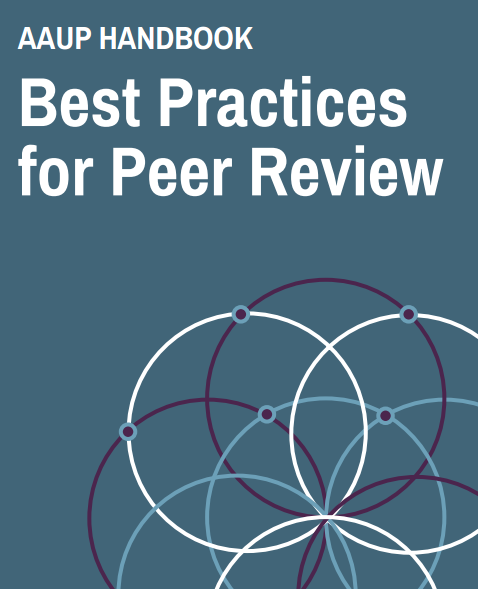Best Practices in Peer Review Handbook


The Association of American University Presses released on June 8, 2016 an AAUP Handbook Best Practices in Peer Review for scholarly monographs. This Handbook is designed to help publishers promote rigorous peer-review standards and intended to offer a reference point for scholars, authors, and universities.
“Peer review helps to uphold the academic credibility of a journal - peer reviewers are almost like intellectual gatekeepers to the journal as they provide an objective assessment of a paper and determine if it is useful enough to be published” (Peer Review, Springer).
“Peer review is essential to the university press mission of advancing and disseminating scholarship… This process provides feedback that is both stringent and fair, enables an author to strengthen a work in progress, and adds value and meaning to the work that is ultimately published, helping inform the deliberations of press staff” (Best Practices Handbook, Preamble: Why Peer Review Is Important)
The Association of American University Presses (AAUP) is an organization of more than 140 nonprofit scholarly publishers from around the world. Since 1937, AAUP advances the essential role of a global community of publishers whose mission is to ensure academic excellence and cultivate knowledge.
After two-year working process, on June 8, 2016, AAUP released a Handbook Best Practices in Peer Review.
Disciplinary expectations, administrative procedures, inter-disciplinary and creative works, and innovative publishing formats may all demand changes in approach, but the Best Practices Handbook provides a solid understanding of accepted high standards against which such necessary changes can be weighed.
Through five sections, the Handbook articulates a set of practices that comprise a rigorous process of peer review for scholarly monographs:
Preamble: Why Peer Review Is Important
Section 1: The AE’s Choices about Why, When, and How to Conduct Peer Review
Section 2: Selecting Peer Reviewers
Section 3: Working with Peer Reviewers
Section 4: Sharing Peer Reviews with Authors
Section 5: Peer Reviews as Documents of Record.
Best Practices Handbook offers a set of guidelines for new presses, editors, constituencies of research universities, foundations, and scholars.
In any case, though strong peer reviews are necessary for moving forward with a project, they form only one part of a broad range of factors, including considerations of fit and budget, that together lead to a publishing decision.
Best Practices in Peer Review is freely shareable as a PDF or online text and will be distributed as a print booklet upon request to members of the scholarly and academic community.
***
Post scriptum.
Peer Review or Open Peer Review (i.e. open-access or disclosed peer review, where the peer review contents are publicized)?
Did you know that the open peer review was one of the main issues raised during the COAR Annual Meeting and Conference 2016?
In his talk “Validation, Evaluation, Dissemination: Academia’s gravest problems show the way to the Next Generation Repositories”, Perakakis Pandelis highlighted that Validation and Evaluation should ensure Quality transparency, Reproducibility and Reliability. This can be achieved by providing open peer reviews, engaging reviewers in transparent inter-/transdisciplinary dialogue and receiving open dynamic assessment though multi-parametric indexes and open reviewer recognitions for works submitted. Pandelis suggested the alternative in Natural selection of academic papers, while Self Journal of Science has been mentioned as an example of the repository with overlay open review services (check out Principles of the Self Journal of Science: bringing ethics and freedom to scientific publishing).
Source:
AAUP Best Practices in Peer Review
Find out more:
Open Peer Review Module: Open access repositories start to offer overlay peer review services
Open peer review : from an experiment to a model
Peer Review Conference (August 9-10, 2016, San Diego, California) the option to attend online
Royal Society Open Science encourages authors to opt for Open Peer Review
The Future Of Open Access: Why Has Academia Not Embraced The Internet Revolution? (Forbes)
Related contents on AIMS:
Opening up the review process with open peer review
Why it’s important for scientists to publish their work, and tips for submitting to F1000Research

